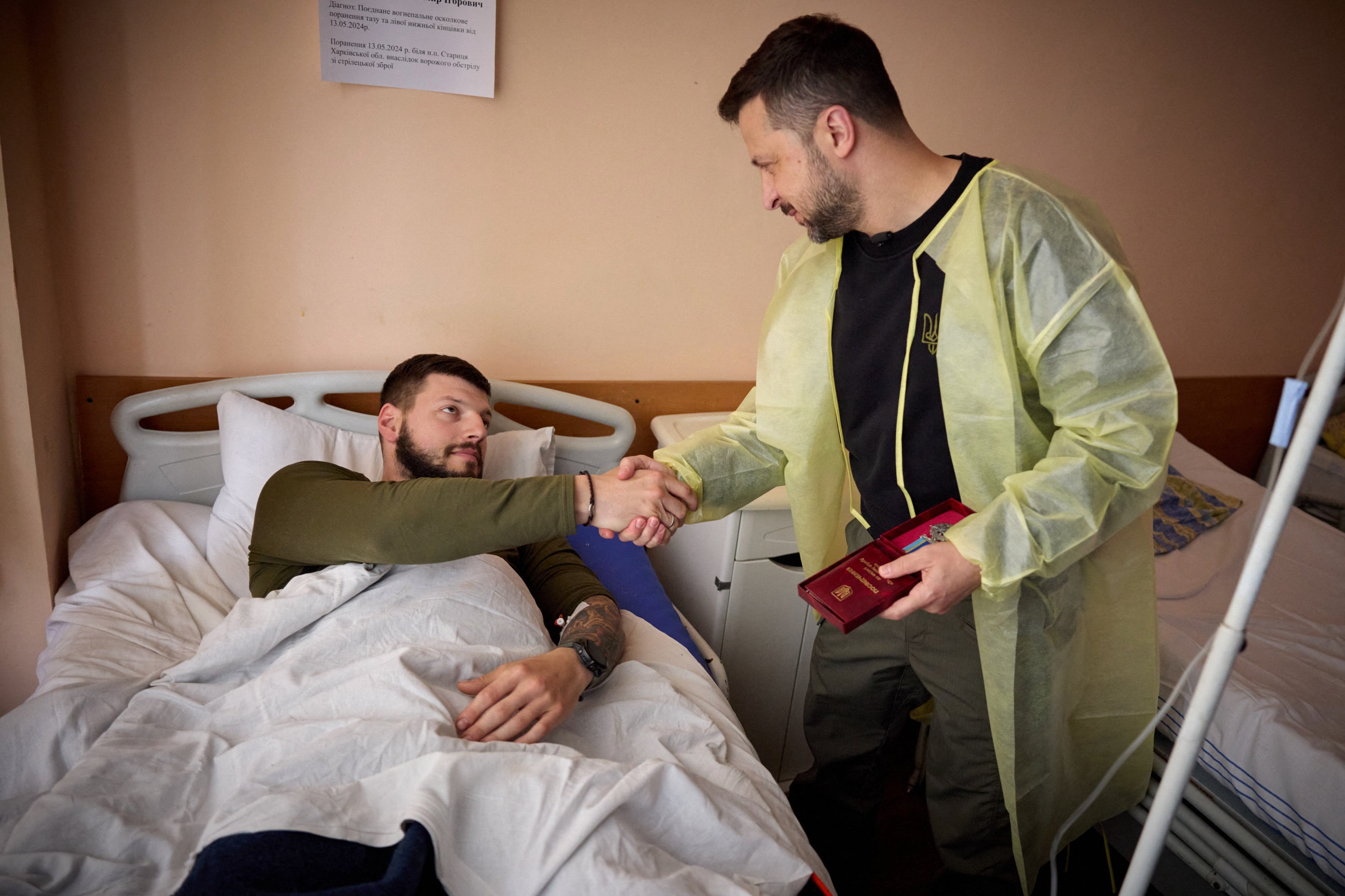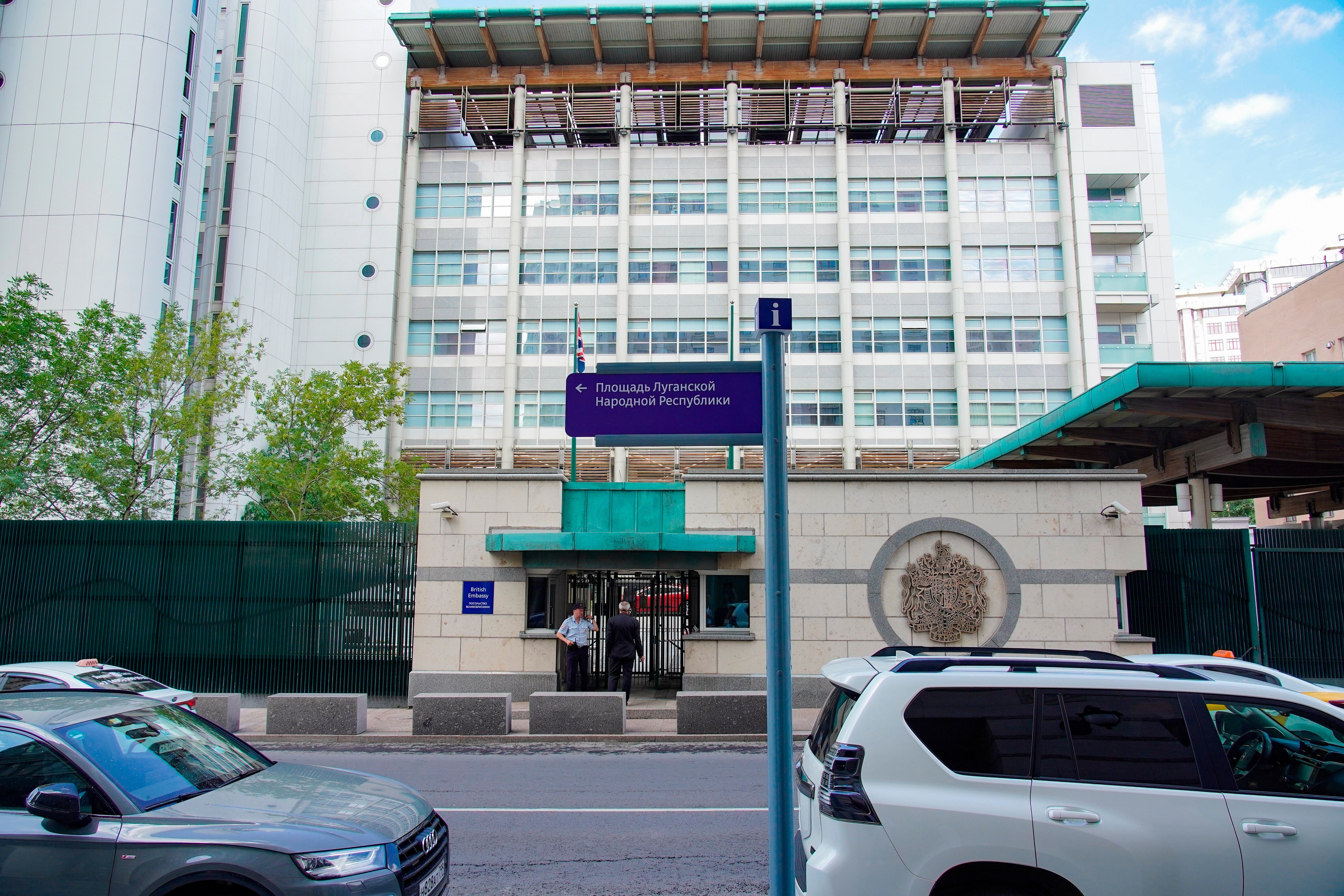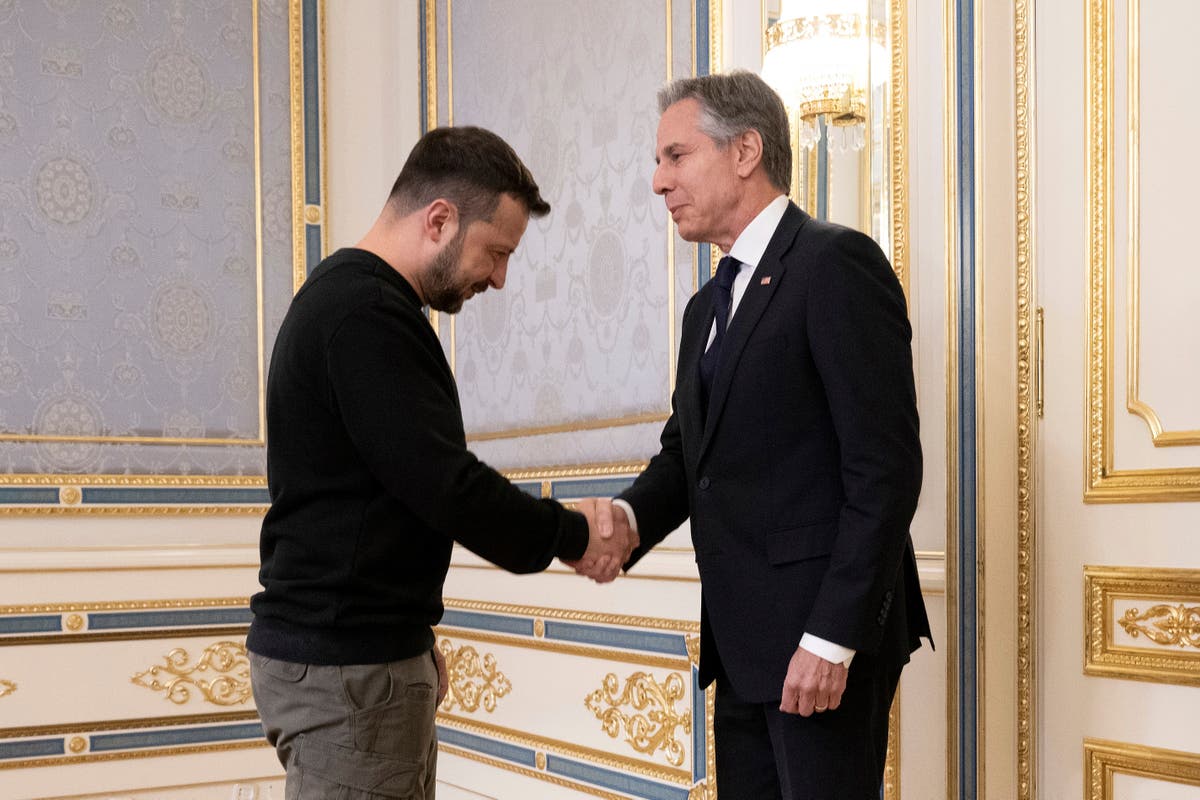Russia-Ukraine war live: Putin tries to claim Russia isn’t after Kharkiv – despite massive attack on region
Volodymyr Zelensky claims his forces have ‘stabilised’ a Russian attack in northeast Kharkiv region
Your support helps us to tell the story
This election is still a dead heat, according to most polls. In a fight with such wafer-thin margins, we need reporters on the ground talking to the people Trump and Harris are courting. Your support allows us to keep sending journalists to the story.
The Independent is trusted by 27 million Americans from across the entire political spectrum every month. Unlike many other quality news outlets, we choose not to lock you out of our reporting and analysis with paywalls. But quality journalism must still be paid for.
Help us keep bring these critical stories to light. Your support makes all the difference.
Russian President Vladimir Putin has claimed there are “no plans” to take the northeastern Ukrainian city of Kharkiv despite tens of thousands of his forces having recently stormed across the border into the region and getting within artillery range of the city.
Speaking on the second day of his two-day tour of China, Putin claimed he had ordered the attack to create a “buffer zone” between Ukrainian soldiers and the Russian region of Belgorod.
When asked if Russian forces planned to take control of Kharkiv city, some 20 miles from the current fighting, Putin said: “As for Kharkiv, there are no such plans as of today.”
While Ukrainian officials and military analysts maintain that Russian forces in the Kharkiv region do not have the manpower or weaponry to take its namesake capital, and that the attack is likely an attempt to create a “buffer zone”, as Putin puts it, as well as draw Ukrainian forces away from other battles further east, there is little doubt that Russia would try to invade the city if it had the capability.
China and Russia reaffirm their ‘no-limits’ partnership
Russian President Vladimir Putin has thanked Chinese leader Xi Jinping for China’s proposals on ending the war in Ukraine, which have been rejected by Ukraine and its western supporters as largely following the Kremlin’s line.
At their summit, Mr Putin and Mr Xi reaffirmed a “no-limits” partnership that has grown deeper as both countries face deepening tensions with the West, and criticised US military alliances in Asia and the Pacific region.
China claims to take a neutral position in the conflict, but it has backed Moscow’s contentions that Russia was provoked into attacking Ukraine by the West, and continues to supply Russia with key components that Moscow needs for its productions of weapons.
A joint statement after Mr Putin and Mr Xi met said that both sides believe that for “a sustainable settlement of the Ukrainian crisis, it is necessary to eliminate its root causes”.
Zelensky visits Kharkiv as battleground situation deteriorates
President Volodymyr Zelensky visited the northeastern city of Kharkiv on Thursday to boost morale and reinforce Ukraine’s troops in the region where Russian forces are trying to press their new offensive beyond the border areas.
Moscow has made inroads of at least several kilometres into the north of Kharkiv region since Friday, forcing Kyiv’s outmanned troops to try to hold the line on a new front as Russia mounts more pressure on the front in the east.
“The direction remains extremely difficult - we are strengthening our units,” Zelensky said after holding a meeting in the city with his top commander and senior military leaders.
The Ukrainian leader, who has cancelled all his upcoming foreign trips as the battlefield situation deteriorates, met wounded soldiers recovering at a medical facility and posed for photographs with troops at another location.

International Monetary Fund to assess Ukraine’s war-torn economy
The International Monetary Fund will start a new Ukraine mission in coming weeks to assess the war-torn country’s economy and performance under a $15.6 billion loan program, IMF spokesperson Julie Kozack said on Thursday.
Kozack told a regular press briefing that the mission on the next loan program review will assess the latest economic developments in Ukraine and revise its macroeconomic framework and analysis of the country’s debt sustainability.
Russia expels British embassy official in tit-for-tat response
Russia has expelled the defence attache at the British Embassy in Moscow in a tit-for-tat response to the expulsion of one of its own diplomats from London last week.
The Russian foreign ministry said an embassy official had been summoned on Thursday and told Captain Adrian Coghill must leave the country within seven days.
The move follows the expulsion of Russian defence attache Colonel Maxim Elovik on May 8, whom the Home Secretary said was an “undeclared military intelligence officer”.
In a statement on its Telegram channel, the Russian foreign ministry said the expulsion of Col Elovik had been politically motivated and caused significant damage to relations between the two countries.

US announces new sanctions over North Korea-Russia arms transfers
The United States announced sanctions on Thursday on two Russian individuals and three Russian companies for facilitating arms transfers between Russia and North Korea, including ballistic missiles for use in Ukraine.
It is the latest round of sanctions imposed by the Treasury and State departments to disrupt and expose arms transfers between the two countries, a Treasury Department statement said.
“Today’s action reflects our commitment to disrupt the DPRK’s (Democratic People’s Republic of North Korea) deepening military cooperation with Russia,” Brian Nelson, the under secretary of the Treasury for terrorism and financial intelligence, said in the statement.
“The United States will continue to take action to hold accountable those who seek to facilitate the shipment of weapons and other materiel to enable Russia’s war,” Nelson added.
It’s horrifying what’s happened to Ukrainians with disabilities during Russia’s war – we cannot abandon them
Used as human shields, starved or deprived of medicines, tortured, abducted, disappeared. These are the potential crimes that have been committed against people with disabilities since Vladimir Putin invaded Ukraine, according to a new 18-month investigation by The Independent.
That doesn’t even cover what those close to the frontline face with no way of getting to shelter or accessing food and water, under some of the most ferocious bombardments of our time.
As Maksym – a Ukrainian man with a disability who was disappeared into Russia early on in the war – told me, those with disabilities are the last to be remembered and the first to be left behind.
Read the full article here:

We cannot abandon Ukrainians with disabilities suffering during war
Comment: Reporting on the kidnapping and abuse of the most vulnerable in Ukrainian society makes one thing clear, writes Bel Trew: in war people with disabilities are the last to be remembered and the first to be left behind
Zelensky seeks to boost troop morale with visit to Kharkiv as soldiers battle Putin’s advancing forces
Ukraine’s President Volodymyr Zelensky sought to boost the morale his troops with a visit to the northeastern city of Kharkiv – with Russian forces making advances across the region.
Kyiv has rushed military units from other parts of the 600-mile front lines to shore up its forces in the area where the Russians launched their attack a week ago, exploiting weak fortifications and undergunned Ukrainian forces to make rapid advances which have sent thousands of refugees fleeing from their homes.
Vladimir Putin‘s forces have made inroads of at least several kilometres into the north of Kharkiv region since Friday, with the city of Kharkiv itself only about 30 miles from the border with Russia.
Read the full article here:

Zelenky seeks to boost troop morale with Kharkiv visit as battle rages
Askold Krushelnycky reports from Ukraine's second city, where the country's president met with generals. Residents say they will dig in if Putin's forces get close to support the soldiers fighting on the frontline
People with disabilities face some of the most brutal conditions during war. We need urgent change
The devastating images from the war in Ukraine are a stark illustration of the consequences of conflict for ordinary people. The threat of injury or death from shelling, drones or missiles hangs over everything – but there is also facing day-to-day shortages of food and water, the destruction of schools and hospitals and potential criminal or sexual violence.
But it is also a fact that these harmful effects are not uniformly felt. Instead, studies show that minority groups are more significantly impacted by the destructive effects because war amplifies inequalities and vulnerabilities that already exist in society.
Read the full analysis from William Pons here:

People with disabilities face some of the most brutal conditions during war
Analysis: Strides have been made in recent decades among the UN and humanitarian organisations to try and put protections in place, writes William Pons. But they need to be enforced and expanded so that the suffering of people with disabilities is not left in the shadows
Russia ramps up strike drone use on Kharkiv front, Ukrainian artillery crew says
Ukrainian artillery on the Kharkiv frontline are facing a bigger threat than ever from Russia’s fleet of Lancet kamikaze drones, according to a howitzer crew fighting there.
One comes, then a second one comes, 10 minutes later a third one comes,” said call sign Artist, the fresh-faced 21-year-old commander of an artillery battery of the 42nd Brigade which has been firing non-stop to repel Russia’s new offensive in the region over the past week.
The soldiers requested that they only be referred to by their military call signs to protect their identities.
The drone, with X-shaped wings and carrying several kilograms of explosive, was already one of the biggest threats to Ukrainian artillery and armour for over a year.
It’s time we gave Ukraine the tools it needs to finish the job
The presence in Kyiv of the US secretary of state, Antony Blinken, at what is becoming a critical juncture in Ukraine’s war of survival against Russia, is, of course, extremely welcome.
Were they being undiplomatically honest, however, the Ukrainians would admit that they would far rather have received a bumper consignment of Patriot missile defence systems, F-16 fighters and Abrams armoured vehicles than the distinguished statesman.
That way, they might have a better chance of preventing the Russians from destroying their second city, Kharkiv. Such a denouement is unlikely – but the possibility of it cannot be dismissed.
Read the full article here:

It’s time we gave Ukraine the tools it needs to finish the job
Editorial: Vladimir Putin is in a hurry to maximise the amount of territory his forces occupy before Donald Trump – he hopes – can gift it to him. Europe must not wait for the Russians to cross the Polish border to realise what is at stake
Subscribe to Independent Premium to bookmark this article
Want to bookmark your favourite articles and stories to read or reference later? Start your Independent Premium subscription today.





Join our commenting forum
Join thought-provoking conversations, follow other Independent readers and see their replies
Comments